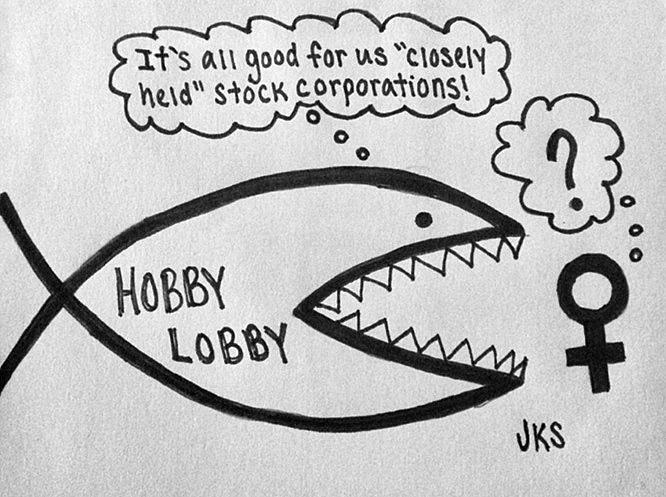Earlier this month, the Supreme Court began hearing arguments regarding the Burwell v. Hobby Lobby Stores and Conestoga Wood Specialties (colloquially referred to as the Hobby Lobby case), which challenged the Affordable Care Act’s birth-control mandate. Hobby Lobby, a privately held craft store chain founded and run by a conservative Christian family, cited personal religious beliefs as grounds to launch a legal battle against the mandate, which allows employees to use its health coverage for certain kinds of birth control.
On June 30, the Supreme Court ruled that Hobby Lobby, a corporation, is entitled under the Religious Freedom Restoration Act to deny coverage under its healthcare plans for birth control it finds to be morally questionable when relating to its own personal religious views.
This extends, in writing, to corporate entities that are “closely held,” according to The New York Times, and whose holders can demonstrate “true religious objection.” It is important to note that the decision was written extremely narrowly, so as to, in theory, relate only to birth control. This way, as some commentators pointed out, the possibility of corporations run by people who do not believe in vaccination coverage or blood transfusions denying such services to employees wouldn’t become a reality.
Although that is a vital and necessary distinction, it only makes the victims of this ruling even more obvious: women. Women use emergency contraception and intrauterine devices, not men. Women use these methods of safe, legal birth control, approved by the medical-ruling bodies of the United States, for a host of reasons, all personal. These reasons are not all related to the single act of preventing pregnancy. It is 2014. We simply do not have time anymore for erroneous, vague moral objections rooted in fear rather than scientific fact.
If believing that emergency contraception falsely causes an embryo to be diverted from the uterus is enough to guarantee personhood under the eyes of the law for corporations, we are sliding down a slippery slope. Indeed, Justice Ruth Bader Ginsberg, who wrote the dissenting opinion for the ruling, warned that the “decision (of startling breadth) would allow corporations to opt out of almost any law that they find “incompatible with their sincerely held religious beliefs.”
The major error, of course, is that against the official word of the American Board of Obstetrics and Gynecology, the family behind Hobby Lobby believes emergency contraception is an abortifacient, and that belief affects employees. It isn’t wrong by any means for the Green family to hold that view, but it is wrong for that view to dictate what care they will offer women of the company in terms of contraceptive benefit. This 5-4 Supreme Court ruling sets a dangerous precedent. Beyond the realm of contraceptive objection, it opens the floor for “closely held companies” (of which there are tens of thousands in the U.S.) to file complaints of greater depth and scope. “Closely held companies” are those with a limited number of stockholders. From here, the country could see waves of companies and corporations filing against policies that “religious objection” could be claimed for: from anti-discrimination to minimum wage laws, to cite Ginsberg and her colleague, Justice Sonia Sotomayor.
There is always the question of how effective the so-called “Sherbert Test” is to determine how religious a corporation is. Where is the line? One might argue that because Hobby Lobby stocks mixed fibers, it is directly contradicting its Christian beliefs: Leviticus 19:19: “Do not wear clothing woven of two different materials.”
Of course, Hobby Lobby might argue that although they don’t wear mixed fibers (though I’m sure they do—“antiquated” biblical laws tend to be ignored by even the most vocally devout) it’s their customers’ choice to purchase it.
Not unlike, perhaps, the choice of a female employee to decide if she wants to use an IUD or take emergency contraception. Similarly, Hobby Lobby imports most of its products from China, a country notorious for its one-child policy, which has led to generations of women getting abortions to avoid breaking the law.
Furthermore, Hobby Lobby, most damningly, covered emergency contraception prior to filing a lawsuit. In order to become a more truthful plaintiff, it dropped coverage. Finally, Hobby Lobby’s retirement plan has stock holdings (more than $73 million worth) in pharmaceutical companies that make the very contraceptive products it claims to oppose, according to Mother Jones.
Hypocrisy should never be mistaken for a Christian value.








